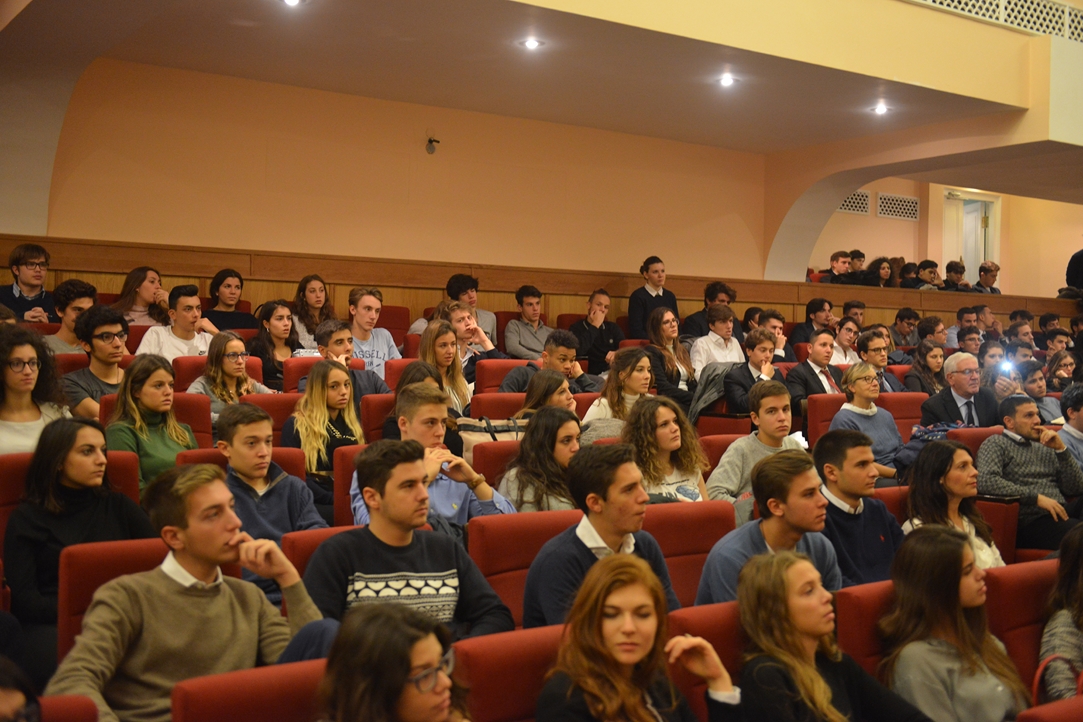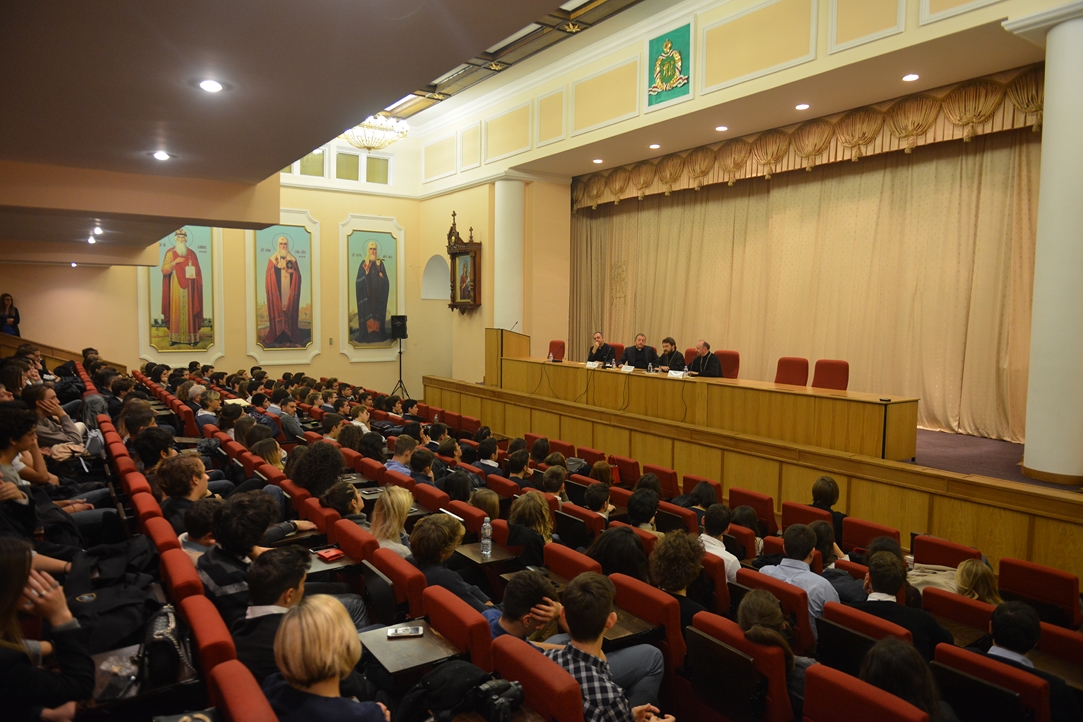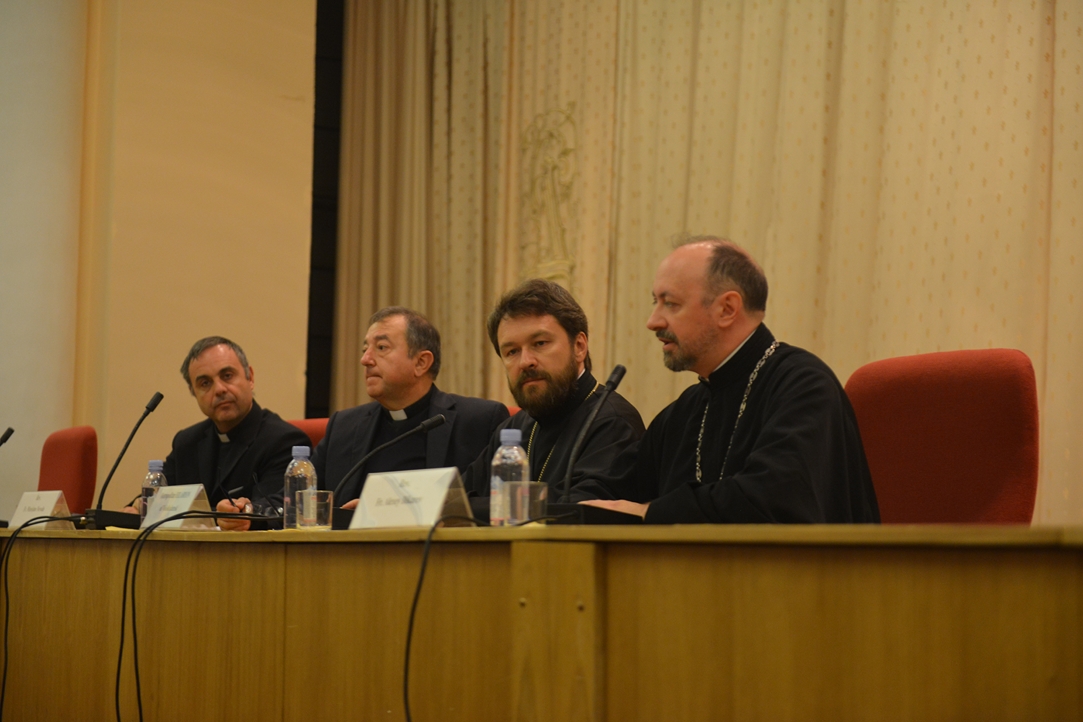Metropolitan Hilarion of Volokolamsk meets with students of Catholic schools in Italy










October 10, 2017 – Metropolitan Hilarion of Volokolamsk, head of the Moscow Patriarchate department for external church relations (DECR) and rector of the Ss Cyril and Methodius Institute of Post-Graduate Studies, met with 250 students and a group of professors of Catholic general education schools run by the Society of Jesus in Rome, Turin, Milan, Naples, Messina and Palermo. The group was led by the Rev. Prof. Massimo Nevola. The Rev. Alexiy Dikarev acted as an interpreter.
The archpastor warmly welcomed the guests, noting that the meeting was taking place next to the walls of the St. Daniel Monastery, the oldest monastery in Moscow. In the course of his address, the DECR chairman told the Italian students about the over millennium-long history of the Russian Orthodox Church, the spiritual rebirth after the 20th century persecutions and the church life in our days:
“The Baptism of Russia by the Holy Prince Vladimir Equal-to-the-Apostles took place in 988 and the Russian Orthodox Church has been the spiritual mother of our people ever since.
In the 20th century the Church experienced the hardest period of trials. One hundred years ago today, in 1917, a revolution happened and power was gained by godless people who waged an active struggle against the Church. They initiated a campaign unprecedented in its scale to persecute the Church. In the course of these persecutions, especially severe in the 1920s-30s, the basic mass of the Russian Orthodox Church clergy were executed by shooting, most of the churches were closed and many of them were blown up. All the monasteries and theological schools were closed.
The situation began changing during the war but the persecution of the Church continued up to 1980, when the Millennium of the Baptism of Russia was marked. It was precisely the St. Daniel Monastery that became the center of the celebrations, and it was the first monastery to be returned by the state to the Church. When the Russian Church began preparing for the celebration, the state authorities indicated that it should be a purely ecclesial festivity: no mention about was to be made about it in the press; no TV reports; society should not be aware of the celebrations devoted to the Millennium of the Baptism of Rus’. However, things did not work out that way because as soon as the festivities started, people began to take a very active part in them and it was impossible to conceal from society the scale of those festivities.
For instance, in a small town with the population of 60 thousand the ruling bishop asked the local governor to offer the stadium for the celebrations. The governor said, ‘What do you want a stadium for? You will not be able to gather together even a thousand people’. As a result, the celebrations were held in a square and attended by 40 thousand out of 60 thousand. It proved to be the same case throughout the country. Then the authorities realized that the Church, for all the 70 years of persecution she endured, continued to enjoy a colossal authority, a colossal influence. And from that moment a period began which we call the Second Baptism of Russia, that is, a revival of church life unprecedented in its scale in our homeland.
In 1988 the Russian Orthodox Church had 6 thousand parishes. Nowadays, after less than 30 years, there are 36 thousand parishes. It means that on average we open a thousand churches a year, that is, three churches a day. Monastic life, too, experienced a colossal revival: while in the end of the persecution period there were only 21 monasteries in the whole Russian Orthodox Church, nowadays there are over 950 monastic cloisters. We had only three theological seminaries, but now we have over 50 functioning theological schools plus over 50 departments or chair of theology opened in secular universities.
I think, never in the history of the Christian Church there has been such a large-scale church revival. May be, something similar took place after the Edict of Milano in the Roman Empire, but we have no statistics relating to that time. And I do not think that even in those years there were three churches opened a day. As for our period, we do have statistical data showing that the revival is unprecedented in scale and it has continued with the same pace already for nearly three decades.
Oftentimes, when I come to Western countries and talk with our Catholic brothers, I hear complaints that the number of parishioners in churches is decreasing, many churches stand empty, some churches are sold or refashioned as restaurants and there are less and less priestly vocations. Some people in these countries even maintain that Christianity appears to have no future in Europe, that Christianity is only a factor of the past. When I am told such things, I suggest, ‘Come to Russia to look what is happening in our country and you will see: Christianity does have both the present and the future’.
I often ponder over this: why in our country the Christian faith arouses such an interest and such a support from people while in the West completely different processes are taking place? I believe, one of the reasons lies in that we in our country have paid a very high price for the right to confess Christ as God and Saviour. People of my generation and older ones remember very well how oppressive were conditions in which the Church had to live. And to this day the revival of church life seems to be a miracle of God that would not have happened if intercession for us had not been made in heaven by numerous martyrs and confessors who paid by their own blood for the Church’s right to exist.
The political processes happening today in European countries lead politicians to say, ‘Europe should not be referred to as a Christian continent. Pluralism should triumph here and for this reason the Christian roots of Europe should not be mentioned’.
I remember how in those years when I served as a representative of the Russian Orthodox Church to the European international organizations in Brussels, attempts were made to draft a European Constitution. A reference was made in the preamble of this document that Europe is rooted in the legacy of the Greek philosophy and Roman law, not a single word was said about the 2000 year-long Christian history of Europe. We as representative of Christian Churches kept saying then, ‘How is that that you wish to delete the 2000 years of Christianity from European history?’ and the reply to us was this: whatever you wish, only we should not mention Christianity. It is my profound conviction that if Europe ultimately abandons Christ, then a two, three or four generations later this land will be inhabited by completely different people who will confess a completely different religion. Only if Europe cherishes and develops its Christian legacy it will be able to withstand the external challenges it has encountered today.
I very much hope that you, when you grow up, will be defenders of the Christian faith in which you have been raised. I wish you that for the few days you are to spend in Russia you may learn about the life of our Church and see what a deep influence Christianity has made on the Russian culture”.
In conclusion of the meeting Metropolitan Hilarion answered questions from students and gave them his archpastoral blessing.
Italian students were interested in particular in the Orthodox archpastor’s opinion about what is exactly the danger of ‘the consumer society’ asserted today as an unfailing model. ‘The ideology of consumer society is radically contrary to the ideals which Christ has foreordained for us in His Gospel’, Metropolitan Hilarion stressed, ‘Let us recalled the words with which the Lord begins His Sermon on the Mount: Blessed are the poor in spirit, for theirs is the kingdom of heaven. Blessed are those who mourn, for they will be comforted. Blessed are the meek, for they will inherit the earth (Mt. 5:3-5). That is, Jesus Christ speaks about what brings happiness to the human being. But the modern consumer society propagandizes, ‘No, you will be happy only if you have much money and a professional success; if you attain great heights in society’.
However, the ideology of consumerism is contrary to not only Christian ideals but also general human values, on which the life of humanity has been built for centuries in all countries and by all peoples, His Eminence stated, ‘In any nation you can be told that one’s happiness on earth is determined by how strong and well-off one’s family is. And this idea of God’s blessing handed down through descendants, through the family, imbues all the religious traditions without exception. Whereas the ideology of consumerism affirms that the family is not the most important thing but the most important thing is to draw the maximum of pleasure from life. So, if you like it you can start a family but if you do not you can live for kicks, in a civil union, and it is not at all necessary to have children to be happy and successful.
‘The ideology of consumerism affirms that one on one’s own can determine not only how to live, not even what one can be. For instance, if God has created one as man but he likes to be a woman, he can resort to a surgical operation to change his sex or, for instance, just call himself by a female name and everybody around will pretend that they take this man for a woman’.
According to Metropolitan Hilarion, this ideology is self-suicidal for a society, ‘If within the limits of tolerance we may say that, after all, let everyone define one’s own values at one’s will, it does not mean that such an ideology should be imposed on children in schools and young men and women in universities.
‘This ideology makes a certain influence on some Christians as well, who begin to reject their own Christian identity. And I think that in this sense, the tolerant Islam is an ally of Christianity because basically (if we speak at least of the moral Islamic postulates) this religion has the same values as those which Christianity has inherited from the Old Testament’.
At the same time, Metropolitan Hilarion pointed to the threat that the radical Islamism constitutes not only to Christianity but also generally to the whole human civilization. “And even greater threat is coming to humanity from those who commit criminal actions using as a cover Islamic rhetoric and cries ‘Allahu akbar!’. Regrettably, what is possible with these people is only one dialogue carried out with the help of arms. The fact that terrorists are losing their influence in the Middle East today is a direct consequence of the interference of Russia in the situation there. And if we speak about the role of the Russian Orthodox Church, then I see it, in the first place, in that we keep reminding the world of the persecution against Christians going on in the Middle East and of the need to work out affective measures for protecting the Christian population in the region”.
In a follow-up of the topic, Metropolitan Hilarion shared with his listeners his thoughts about what needs to be done to protect the Christian presence in Syria after the end of the hostilities there. ‘In the first place, the problem at issue is the restoration of Christian shrines as well as the Syrian infrastructure, that is, the towns and village to which Christians and people of other religious traditions are to return after the horrors of war are over’.
His Eminence noted that it is one of the topics on which the Russian Orthodox Church is conducting at intensive dialogue with the Vatican. ‘We are working out and realizing joint humanitarian projects aimed to give relief to Christians in the Middle East. This topic was the main one during the meeting between Pope Francis and Patriarch Kirill, which took place on February 12, 2016, in Havana. And two weeks ago I visited the Vatican, met with the Head of the Roman Catholic Church and had a very detailed talk on the agenda items. Among other things, we spoke about the ways of implementing specific projects and the agreements reached at the Havana Meeting’.
His Eminence also shared with Catholic students his personal impressions of meetings he had with Pope Francis: ‘I should say that he is already the third Pope with whom I had an opportunity to meet and talk. As a Jesuit, he certainly has an excellent education and as a man he has many qualities which make communication with him pleasant, interesting and useful’.
Answering the question about the authors whose books are to be read by those who wish to familiarize themselves with Russia and its history, Metropolitan Hilarion emphasized that Russia, both past and present, is impossible to understand if you have not read Dostoyevsky, ‘A very important author who speaks of what happened in the Soviet time is Solzhenitsyn. Besides, there is a whole number of interesting works by modern authors which are translated also into Italian’.
Speaking at his listeners’ request about the present state of relations with Western countries, Metropolitan Hilarion said, ‘I think, the collapse of the Berlin Wall was a historic event because essentially it meant the collapse of communist regimes in Europe. For the last quarter of the century our peoples and cultures have become closer to one another. And would not wish at all that, for political reasons, circumstances and differences among various countries, an iron curtain should emerge again between East and West. And I very much hope that the doors of our countries will remain open for one another’.
DECR Communication Service
